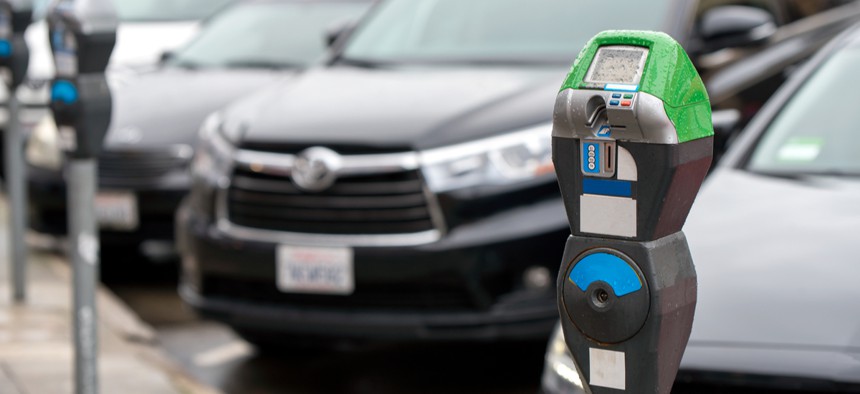What We Fight About When We Fight About Parking

Minute of love/Shutterstock
The urban economist Donald Shoup collects reports of violence that erupts over parking spaces. To him, disputes between drivers are signs of a bigger problem.
The latest entry in Donald Shoup’s collection of fatal parking disputes is particularly grim. In late April, a 57-year old woman named Lourdes Estremera set up a grill on the street in North Philadelphia and got into a physical fight with a neighbor who wanted to park in the spot. Police arrived, and the woman died while being interviewed. The exact cause of death was unclear, according to local news reports. But the source of the inciting conflict was plain to Shoup, a distinguished professor at UCLA’s department of urban planning and a well-known parking policy expert. Estremera was a casualty in what Shoup calls the war over curb parking.
Perhaps that sounds insensitive. To him, it’s basic economics. A commodity in high demand, such as urban curb space, must be priced. “Free” street parking in congested areas invites parking-seekers to stake and defend their claims in other ways, such as putting out lawn chairs, idling the car for hours, or bursts of violence that can sometimes lead to death.
“You don’t get murders over Coke bottles or t-shirts,” Shoup said.
To Shoup, parking disputes that turn deadly demonstrate why cities must pay closer attention to these contested spaces, by setting up meters and enforcing restrictions. In decades of research, Shoup has examined other social costs of free and overabundant parking, including wasted space, time, and gasoline, and lost revenue that local governments could easily use. He hasn’t formally analyzed them, but he’s also been gathering news reports about violent curb conflicts for about a decade.
Consider this gruesome headline from New York City: “Brooklyn dad shot dead on Father’s Day was killed because of a months-old fight about a parking spot.” Or this lede: “A man and a woman from South Los Angeles have been arrested for stabbing a woman to death in front of her children over a parking space at a swap meet.”
A quick Google search of parking spot violence will turn up an alarming quantity of such incidents. Sociologists and criminologists theorize as to why violence can erupt from such seemingly inconsequential concerns. Jeffrey Butts, a professor at the John Jay College of Criminal Justice at the City University of New York, says that the dynamics of parking provocations are sometimes similar to those of gang violence: Individuals who think their territory is threatened feel that they have to respond with violence to protect it.
Curbside horror stories are often dispatched from poorer neighborhoods, but that may just reflect the nature of sensational crime reporting; the affluent are just as guilty of getting upset over a lost spot or a dinged door. (Case in point: celebrity parking assailant Alec Baldwin.) “Everyone is capable of violence,” Butts said. “This is not just about cities, or poor people, or congested neighborhoods. It’s a general human thing.”
Roberta Senechal de la Roche, a Washington and Lee University history professor who studies theories of violence, said that some parking altercations may be also understood as the attacker trying to save face confronted by a grievance. She cites University of Virginia sociologist Donald Black, who wrote in his book Moral Time that“[m]en of honor are known for their ‘touchiness,’ and might construe various incidents short of direct insults as challenges requiring a defense.” (Other genders could conceivably be included.)
One thing that seems to amplify the odds of violence: the presence of automobiles. Butts pointed to taxi drivers who dangerously speed up behind cyclists, or pissed-off motorists who run other cars off the road. A vehicle provides both social insulation and a powerful weapon to use against your tormentor. “Having that box around you protects you from the reprisal of others,” he said. “Anything to do with a car is more likely to provoke a violent response.”
Shoup is less interested in the psychology of road rage; to him, the parking spots themselves are the indirect culprits, and proper metering is the obvious solution. Butts, however, fears that that raising the price of parking could risk punishing lower-income curb users. To end parking violence once and for all, cities must address road violence, too. That means creating transportation networks that allow fewer people to own cars to begin with.
In the end, there’s probably only one clear response to Shoup’s morbid inventory. Said a nine-year-old boy after overhearing the gunshots that killed a man in a curbside dispute in Las Vegas last year: “I just think it’s so sad someone had to shoot someone over a parking spot.”
Laura Bliss is CityLab’s west coast bureau chief, covering transportation and technology.
NEXT STORY: Ranking the Country's Parks





